This has to rank among one of my most favorite lessons to teach. The thought of packing a suitcase for a fun trip gets the kids excited and thinking.
Poetry Around the World
I thought of this lesson this past summer for our Poetry Around the World camp.
*This post contains affiliate links. For more information, see my disclosures here.*
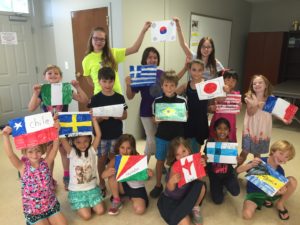
We had spent the first day writing poems about the many different places around the world. So for the second day, I wanted to focus on preparing for the trip!
Shel Silverstein
I had recalled a favorite childhood poem of mine written by Shel Silverstein, titled, Sarah, Cynthia, Sylvia Stout, Would Not Take the Garbage Out. If you’re not familiar with this poem, it’s a classic must read! You and your children or students will surely love it. It’s found in Silverstein’s book, Where the Sidewalk Ends*.
Rhyme
In the poem, Shel Silverstein lists oodles and oodles of different pieces of trash using rhyme.
Alliteration
I thought we could write a poem listing the things we would want to pack for our trip using rhyme as well.
Then, I took it a step further and decided to add alliteration (a series of words beginning with the same sound). Shel Silverstein’s title uses alliteration by using names that all begin with the “s” sound.
So here’s how we completed the poem “Packing” and the steps you can follow as well! This lesson works best for students in Grades 2-5. I’ve included a version for K-1 or struggling writers below.
Common Core State Standards
NOTE: This lesson can address the following Common Core State Standard: CCSS.ELA-LITERACY.RF.K.2.A. L.K.2.C and L.K.2.D.
NOW FOR THE LESSON!
Have your students:
Brainstorm
- Brainstorm a long list of things that they would actually pack for a long trip.
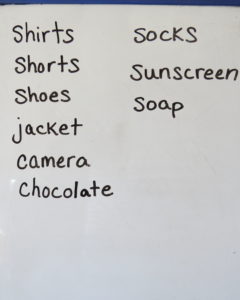
Beginning Sounds
2. Group words that begin with the same sound.
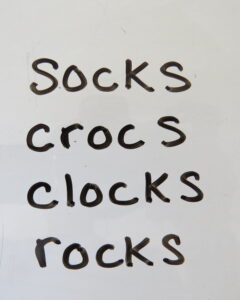

Rhyme
3. Group words that rhyme.
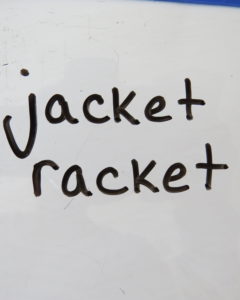
Add Words
4. Then, add words to each group so that there’s 2 or more words in each group of alliteration and rhyme. These added words can be ANYTHING! They don’t have to make sense or be things you’d actually pack. This adds humor to the list.
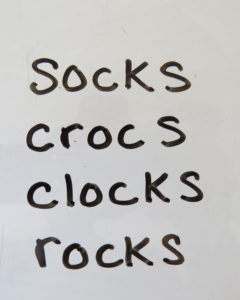
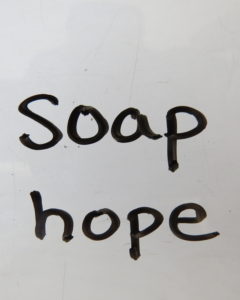
Alliteration–Squares
- Draw a square around each group of words that begin with the same sound.
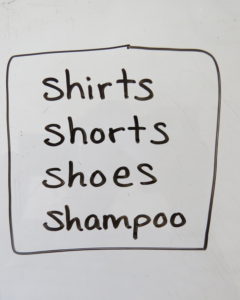
Rhyme–Circles
- Draw a circle around each group or words that rhyme.
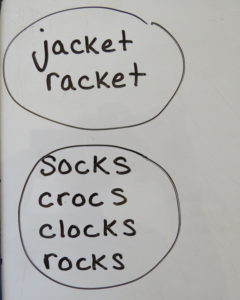
Younger or Struggling Writers
This lesson may be too difficult for young or struggling writers. This lesson can actually be taught in 4 levels of difficulty.
Phonetic Spelling
For the 1st level, students can write a list of things that they are thankful for using phonetic spelling. That means that they write the letters that represent the sounds that they hear.
For example, they might write family using the letters, FAMLE. Writing FAMLE for the word FAMILY is age appropriate and to be praised and encouraged. The child is writing the sounds that he/she hears.
Alliteration
The next level of difficulty is writing groups of words that begin with the same sound (alliteration).
Rhyme
Level 3 consists of writing groups of words that rhyme.
Alternating Rhyme and Alliteration
The 4th and final level is the original idea for this lesson. Students write a long list of words. Their groups of words alternate between rhyme and alliteration.
NOW TO WRITE!
I had my campers write on this bordered piece of paper so the final draft would look nice.
Title
6. First write the title “Packing” at the top of the page. OR students can use ABC stickers* when they’re done to write “Packing.”
Alternate Rhyme and Alliteration
7. Then, to write the list, alternate by writing, a group of words that rhyme (circled group), a group of words that begin with the same sound (squared group), a group of words that rhyme (circled group), a group of words that begin with the same sound and so on until they’ve used up all of the words that had circles and squares around them.
Rhythm
Remind the students to consider rhythm so that the poem has a bit of a beat. To create this, they might need to add the word “and” here and there.
EASY ART ACCENTS
8. To finish off the poem, I brought out my sticker collection for the kids to peruse. They found stickers to fit their lists and added them to their final drafts for a simple art accent.
Student Samples
Check out these examples!
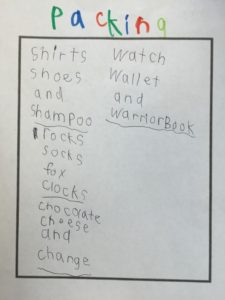
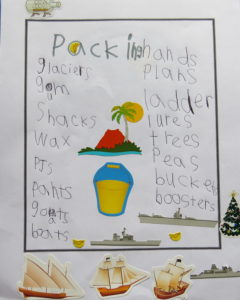
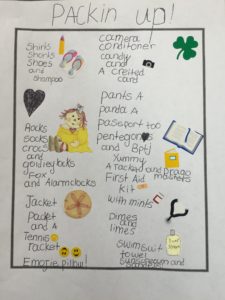
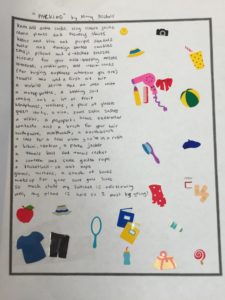
Print the Lesson
Here’s the full lesson for you to print out and use.
A Thanksgiving Version of the Poem
This poem was so much fun, I ended up teaching it again in November for Thanksgiving, titled, “I’m Thankful For.” If you enjoyed this guided writing lesson, you’ll also want to try St. Patrick’s Day Limericks and Rhyming Couplets and Quatrains.
GAMES TO PLAY!

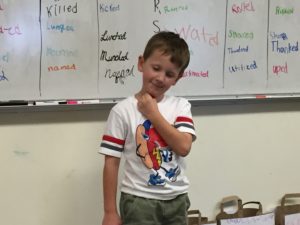
Fill in the blank-Rhyme
Fill in the Blank Rhyme is fast and fun!
Common Core State Standards
NOTE: This game can address the following Common Core Standard: CCSS.ELA-LITERACY.RF.K.2.A
First, divide the group of children into two groups, a left side and a right side.
Then, one child from each group stands up. Begin a phrase from this list.

Next, the two children race to fill in the blank with a word that rhymes with the phrase!

Fourth, they sit. The next two stand. It’s meant to move quickly and often gets fun and silly!
For example, “Shout a ____” may stump the children so they’ll shout out made up words (that indeed rhyme). You can accept these made up words or wait for them to come up with something that is real such as “Shout a pout,” which itself is funny.
You don’t need to go through the entire list. Play according to the time you have. There are no points, no wins. Just fun!
Print the Instructions
Here are the instructions for you to print out and use.
We also play the regular Fill in the Blank game (without rhyme) following various writing prompts. It can go along with ANY prompt really. It’s just a fast, short, sweet, fun game to play anytime!
